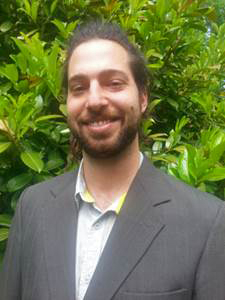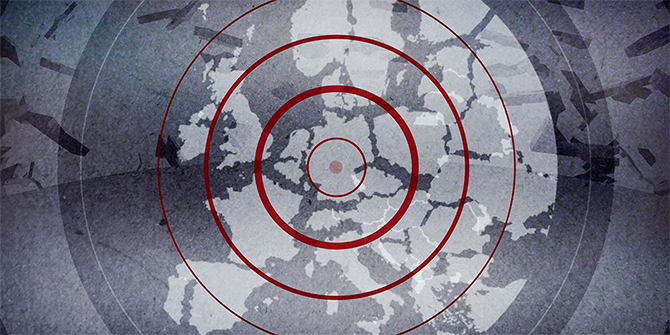 In the Department of Government, we value our students as active members of our research community.The Postgraduate Dissertation (GV499), gives students the opportunity to develop independent research skills and expand academic horizons over an extended piece of writing. We interviewed some of our MSc graduates to learn about their outstanding work and how the LSE’s unique learning environment shaped research passions into first class dissertations.
In the Department of Government, we value our students as active members of our research community.The Postgraduate Dissertation (GV499), gives students the opportunity to develop independent research skills and expand academic horizons over an extended piece of writing. We interviewed some of our MSc graduates to learn about their outstanding work and how the LSE’s unique learning environment shaped research passions into first class dissertations.
Daniel Arnon, winner of the GV499 prize for best dissertation in MSc Political Science and Political Economy, tells us about his research and how studying at the LSE equipped him with the analytical skills and methodological expertise to pursue a PhD in Political Science.
Tell us more about your research, and what drew you to the research topic.
My research in recent years has been about the effects of religion on politics. Having grown up in Israel as a secular Jew, where there is no separation of church and state, I was not particularly fascinated by religion. Judaism, it seemed to me, “belonged” only to those who practiced it avidly, and its political ramifications were clearly marked in representative parties for each segment of Jews in Israel – The Ashkenazi Ultra-Orthodox party (Yehadut Hatorah), the Sepharadic Ultra-Orthodox party (Shas), the national religious Jewish party (previously Mafdal, now HaBayit Hayehudi).
When I moved to the U.S. in 2010, I expected to see the “benchmark” version of a state showing no particular preference to one form of religion or the other. What surprised me most was how vibrant religion is in the U.S. I had always assumed that a stronger separation would lead to a decline in religious practice, but the data show a different story. While the Quakers and evangelical Christians I had encountered were not part of a religious political party, their religious beliefs had staying power in the broad American political conversation and many times was the driving force of legislative actions in Congress.
My recent paper attempts to disaggregate, separate out and estimate the effects of U.S. Senator’s religious beliefs on their overall voting on policy issues. What I believe to be the most important addition is that I treat religion as multi-faceted. I take into account not only the denomination that they belong to, but I evaluate the importance of their religious practice to them by combing through local newspaper reports that indicate a formal and informal tie to a particular place of worship. I also estimate their theological leaning based on speeches they have given. I find that each of these religious elements separately and cumulatively have predictive power, and that they are independent of the senators’ political ideology and their constituencies’ religious beliefs. Senators who attend a religious place of worship regularly, and belong to an evangelical denomination (or other similar “high-demanding” religious practices like Mormonism or Orthodox Judaism), will be associated with a “liberalism score” 9-11 percent lower than senators who have no religious practice and do not belong to a religious community.
What opportunities has LSE given you to explore and develop your research interests?
The topic of religion and politics is not extensively covered in the field of quantitative political science. While I was interested in this topic from my arrival at the LSE, I found myself drawn to methodological classes that would improve my ability to say something about this topic in a more precise way. It was these classes that gave me the appropriate tools to answer a question I found puzzling. After I received these tools, I went to the literature and was able to construct a more precise way, I believe, to understand the multi-faceted aspects of religion.
What LSE resources did you draw upon to write your dissertation?
The resources I drew upon were mainly the analytical thought process I received during the year, and the hands-on methods classes that gave me the tools to make valid empirical inferences.
How has your research contributed to social science debate and what is the impact of your research in practice?
I think that religion has been underestimated as a tool for political mobilization. Obviously, with religion making headlines these days it is easy to mistake it with radicalism and extremism. I approach religion, and particularly churches, as actors that operate within market forces and extremism as one of many political outcomes of successful religious mobilization. Religious entrepreneurs compete, where they can, to save souls, and this process in inherently political. A successful entrepreneur who creates a committed community, has leverage within the political system, just like many other groups that are able to convince people to mobilize – unions, industry, farmers and corporations. We have discounted the church as a valid political actor because many times we see the “other-worldly” benefits they offer to their congregants as immaterial, since these benefits are precisely not materialistic. What I think is most interesting in my findings is that these religious practices have political staying power over not only the laymen who participate in church activities, but also on senators who face such an extensive system of constraints – their constituency, party and political ambitions. I hope that this leads to a revaluation of religion as a political operator that responds to market and legal incentives, and when successful can have a lasting effect in its adherents’ political views.
What advice would you give to other students considering taking a dissertation course?
It is a lot of hard work. I would suggest taking your time to find an idea that is appealing to you. If a puzzle sticks with you for long enough, you’ll be willing to put in the time to try to solve it, and you won’t be satisfied with having inadequate explanations. Find the tools that LSE will give you along the year to figure out what the right question is, since some questions can be answered only in certain ways. With the right tools and the right puzzle in hand, the only thing left to do is go sit in a room, and come up with a good plan to answer it.
What have you done since graduating?
I am currently pursuing a PhD in Political Science at Emory University. I plan to continue gaining methodological tools to answer interesting questions. I am hoping to expand my area of questions beyond religion and politics, to include conflict and peace studies, the Israeli-American relationship and other questions that may just pop up. The MSc at LSE has advanced my methodological tool kit extensively, and has put me in a significantly better position to answer the questions that I will find interesting in the near future.
For further information on the Department of Government and our MSc programmes, visit the Government website.





